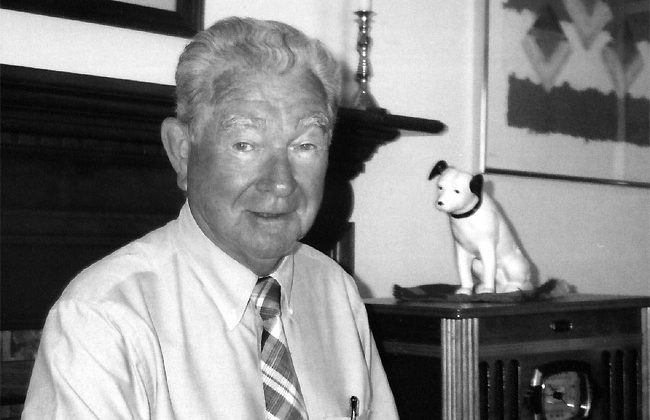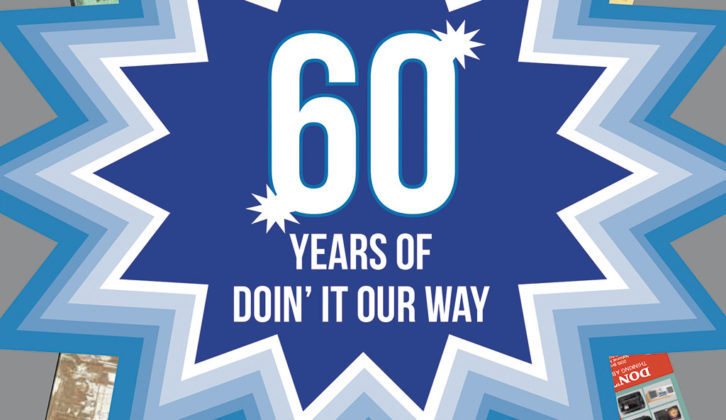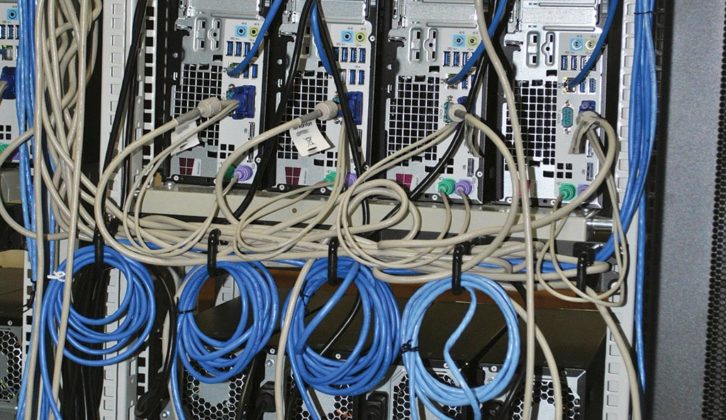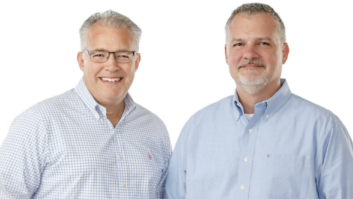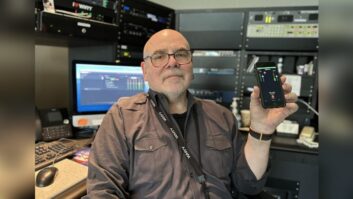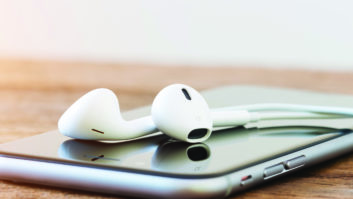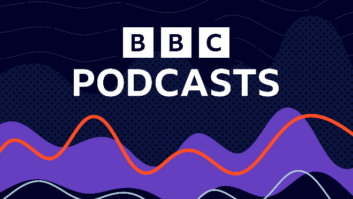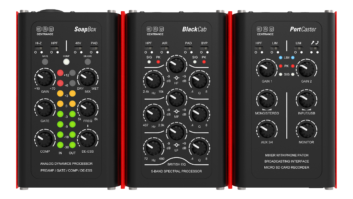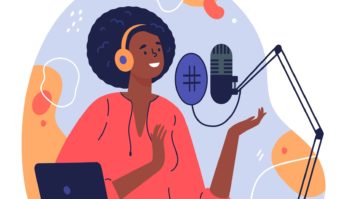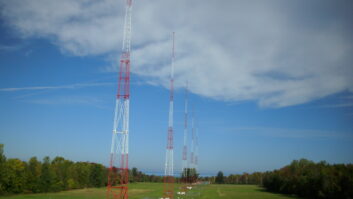OTTAWA — These can be tough times for people working in radio; whether they are full-timers at a station or freelancers doing radio work on a per project/per shift basis. Playout automation systems, industry consolidation, along with low wages for everyone other than morning show stars means that there are fewer opportunities for sustainable careers in radio broadcasting; no matter how much one loves the medium.
Fortunately, the rise of podcasting (prerecorded audio programs streamed on demand on the web) is offering diehard radio broadcasters the chance to supplement their incomes, find new job opportunities, or just add one great career on top of another. The proof is illustrated by the following four profiles of broadcasters who are active in podcasting today — and making a living doing it.
BIG IN BOTH MEDIA
In the United Kingdom, Peter Donaldson is a radio star, literally. He hosts the 4–6 p.m. show on London’s Absolute Radio.
“He’s [Donaldson] interviewed everyone from Liam Gallagher, don’t ask him about Idris Elba’s hat. to Paul Weller,” says the Absolute Radio website. “He’s buddies with Biffy Clyro and Mumford and Sons and has had people like Kelly Jones, the Manics, Tom Odell and Miles Kane co-host his show.”
According to Donaldson, his radio career “started fairly late in the day around 25 over at Xfm after a career in local government (social housing),” he said. “I moved from work experience to assistant producer, to sidekick on Lauren Laverne, latterly Alex Zane’s breakfast show, ending up with my own show on overnights — moving over to Absolute Radio around 2011, hosting weekend shows, and now the late show Monday through Thursday.”
In addition to his successful radio career, Pete Donaldson is also a long-time host on “The Football Ramble;” a top-rated sports podcast in the U.K.
“I started helping out with ‘The Football Ramble’ around 10 years ago, editing and co-hosting,” said Donaldson. “Since the humble beginnings of the show it’s gone from strength to strength, we’ve done live shows right around the British Isles and mainland Europe, and have released a book with Penguin.”
Drawing on the success of “The Football Ramble,” Donaldson and two colleagues have launched a podcast production company called Radio Stakhanov. “We currently have seven podcast shows currently in production, from a wrestling show to one about life in Japan,” he said. “At Radio Stakhanov we have built our own recording studio, which has given us a flexibility and scalability that some podcast producers don’t have.”
Pete Donaldson loves working in both the broadcasting and podcasting worlds. “For a presenter who’s been in radio for just under nine years, the freedom that podcasts present is a very alluring one,” he said. Meanwhile, “The skills I’ve picked up in studio have been incredibly valuable when cobbling together podcasts every week. They’re very different disciplines, but for anyone who’s spent any time in front of a microphone in a radio context will get a kick out of producing them.”
PRODUCING PODCASTS FOR PAY
Inside a long, narrow suite in a downtown Ottawa office building, there lives a bare-bones yet broadcast-quality podcast recording studio named Pop Up Podcasting (popuppodcasting.ca).
Owned and operated by JP Davidson, Pop Up Podcasting is built around a four-position roundtable (and chairs) equipped with four Electro-Voice RE320 broadcast microphones. The microphones (and their accompanying headsets and desktop control switches) are connected by cables back to an Allen & Heath Qu-Pac portable digital mixer, which is linked to a Windows 10 PC running Hindenburg Pro editing/mixing software. It sits away from the roundtable on a side table workstation, along with the mixer and a pair of Tannoy Reveal 502 loudspeakers.
During recording sessions, JP Davidson sits at the mixer/computer workstation, managing the levels and keeping an ear on audio quality. He also uses this workstation to edit the spoken word audio and add music and effects as needed.
The results are professionally polished podcasts that sound as good as anything created in a top-end music recording studio. But thanks to Pop Up Podcasting’s bare-bones approach, the cost to record here is much less. This is why his studio has been able to attract nonprofit groups like Greenpeace as clients; along with the Royal Bank of Canada and the Globe & Mail newspaper; among others.
For many years, JP Davidson was a freelance radio reporter/producer; making audio shorts and documentaries for BBC Radio, CBC Radio, National Public Radio, among others.
It wasn’t an easy life. “Money has been drying up in radio for years due to reduced radio budgets; making it harder for freelancers like me to make a living,” said Davidson. “But I only got into podcasting for the fun of it; to test out this new medium and see what I could do with it.”
It didn’t take long for potential clients to find JP Davidson and ask him to produce podcasts on their behalf — and to pay him for his efforts. Davidson started out recording these podcasts at the clients’ locations using portable audio equipment, and editing the programs at home on his laptop computer. “However, it soon became clear that I needed a more professional space to give me the sound quality they wanted me to achieve, and the image I needed to win higher-end business,” he said. So in mid-2016, he decided to risk leasing space in this office building, and Pop Up Podcasting was born.
The gamble has paid off. “Today, I am so busy doing podcast production for my clients, that I have little time to do my own podcasts; let alone radio work,” said Davidson. “Podcasting is letting me build a good future for myself, at a time when radio freelance dollars are getting harder to find.”
FROM BROADCAST TO PODCAST
London audio producer Matt Hill started out in theatre, but eventually ended up at the BBC’s Channel 4 where he helped them develop three radio stations for the network’s proposed DAB service in 2008. Specifically, Hill was tasked with finding international content to fill the DAB stations’ broadcast schedules, which meant “I was listening to a lot of American, Australian and Canadian podcasts,” he said.
It was this exposure that inspired Hill to produce his own podcasts, after Channel 4 pulled the plug on its planned DAB service. This led him to The Guardian newspaper producing various podcasts on their behalf. “I helped train print journalists to be broadcasters,” Hill said. “I got a bit of a name for turning their expertise into podcasts that built interest in the newspaper’s print/online content.”
After leaving the Guardian, Matt Hill established his own podcast production company/studio. Called Rethink Audio, Hill’s company has continued to produce podcasts for The Guardian, plus BBC Radio 4, the British Academy of Film and Television Arts (BAFTA), Broadcast Magazine, Private Eye and Vice Media.
Rethink Audio also produces/distributes its own podcasts paid for by advertising and listener subscriptions. They include “Spark — True Stories,” “The Media Podcast,” “For Formula One’s Sake,” “The Modern Mann” and “Close Encounters.” These last two shows won awards at the British ARIA awards for Best Podcast in 2016 and 2018 respectively. Matt Hill won Online Producer of the Year at the Audio Production Awards in 2013.
“I estimate that I spend 70 percent of my time producing podcasts for our clients, and 30 percent for ourselves,” said Hill. “We do the latter because we love the intimacy and creativity that podcasting offers. For someone like me who has worked in theatre and broadcasting, it is a great career that offers so many possibilities, and a good way to make a living.” He added that the broadcast skills he learned at “Channel 4 Radio” were central to his subsequent success as a podcaster — and a resource that other broadcasters can use to enter this new medium too.
BROADCASTER PODCASTS
Canadian audio producer Veronica Simmonds began producing podcasts for the magazine Visual Arts News, “interviewing all the rad artists on Canada’s East Coast,” she said. This led to Simmonds to broadcasting “Braidio.” It was a uniquely intimate show on Halifax station CKDU 88.1 FM where she interviewed guests live while braiding their hair.
Simmonds’ solid on-mic performance, creative production, and innovative ideas in both media caught the attention of CBC Radio. Soon, her work was being aired on national CBC programs such as “Ideas,” “Spark” and “The Doc Project.”
Despite her broadcast success, Simmonds has never forgotten her love for making podcasts. And there’s the rub: Mindful of her knack for podcast production, CBC Radio has hired her to do the same for them.
“Today, I work with CBC Podcasts producing new series,” Simmonds said. “The experience is certainly different than the ‘out of the closet’ productions that I did in my earlier years. It’s now done in a professional studio, allowing me to have the resources I need so I can focus on the craft of creative audio production.”
In this role, Veronica Simmonds is able to make podcasts like “Alone: A Love Story,” which she describes as “as a really deep, novelistic memoir about love and loss written by Michelle Parise.”
“I also produce ‘Sleepover,’ where Sook-Yin Lee brings together three complete strangers for 24 hours to talk about what’s difficult and try to make it better,” Simmonds said. “And I’m currently developing a new series called ‘Tai Asks Why,’ which chronicles the adventures of an 11-year old boy genius named Tai Poole as he tries to find answers to some of life’s most complex questions.”
After making these comments, Simmonds draws a useful distinction between podcasts and broadcasting; one that explains why podcasting isn’t just “streaming radio on demand.” “With a podcast, a listener can binge on the episodes and immerse themselves totally in the content,” she said. “With radio, you can tune into a single program on air, but you can’t delve deeply into it the same way by listening to multiple episodes and get the full experience.”
The takeaway: Veronica Simmonds has found a way to combine the worlds of broadcasting and podcasting, making a decent living as an audio producer in the process. Struggling radio-only professionals, take note!
James Careless reports on the industry for Radio World from Ottawa, Ontario.
